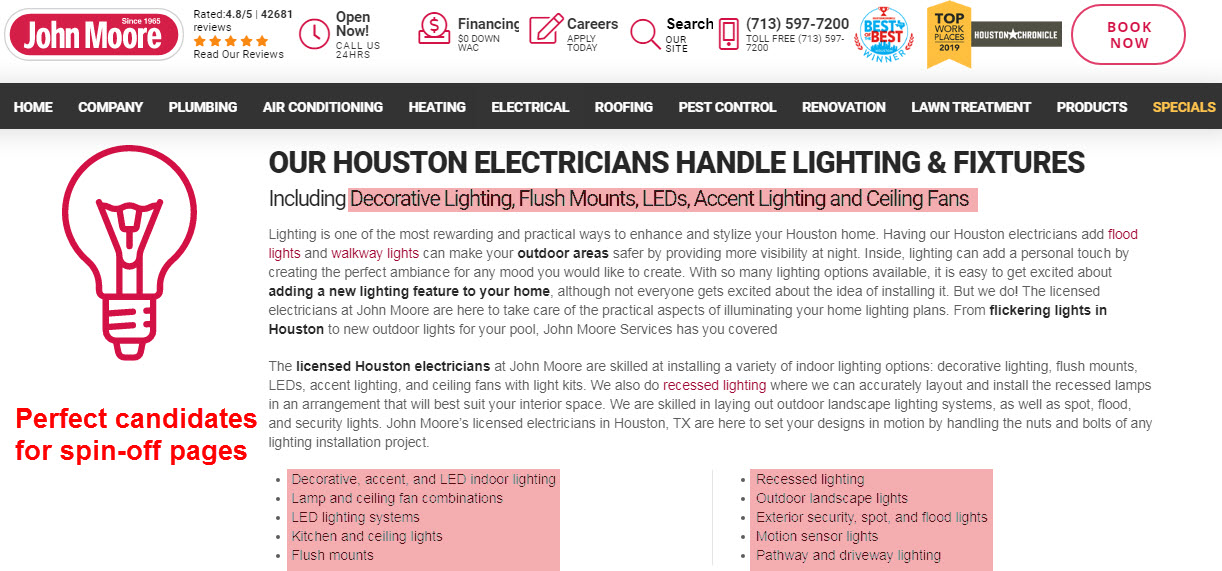
You’ve been on many sites that have them. Your stronger competitors probably have some. You may even have a few on your site. In any case, what I call “spin-off pages” aren’t a new thing, but SEOs and business owners tend not to think of them often or at all, and almost never do they treat spin-off pages as a major part of their on-page local SEO work. That’s a tough break for them, but great news for you.
What is a spin-off page? It’s a new page you create that’s all about a more-specific version of a service/product/treatment for which you’ve already got a page on your site.
In other words, you identify a page on your site about a service (or other offering) you consider a high priority, you think of ways to bust that page into smaller chunks, and you create a page on each chunk. (And you keep the original, broader page, and maybe even build it out more.)

The pages will probably overlap somewhat, but they shouldn’t be clones of each other. Either they’re on different variations of a service, or they’re on different brands, or they’re about commercial versions of residential services, or they’re about the same service for different kinds of customers/clients/patients.
Bring out your inner Bubba from Forrest Gump (not only an expert on shrimp, but also a formidable local SEO).
What are examples of spin-off pages?
Below are examples of spin-off pages I did for clients. (In many of my other blog posts I wheel out examples by name, though I think in this post it’s more interesting at this level of detail.)
Pest control example: we created not just a page on bee extermination, but also a page on hornet control, wasp control, yellow jacket control, and carpenter bee control.
Plastic surgeon example: we created not just a page on rhinoplasty, but also a page on rhinoplasty for teenagers, a page on revision rhinoplasty, a page on “ethnic” rhinoplasty, and others.
Electrician example: we created not just a page on lighting installation, but also a page on dimmer installation, recessed lighting installation, chandelier installation, pool lighting, and others.
Divorce / family-law attorney example: we created not just a page on child-custody cases, but also a page on joint custody, sole custody, and modifications of custody.
Couples’ therapist example: we created not just a page on couples counseling, but also a page on marriage counseling, relationship counseling, and relationship counseling for individuals.
Plumber example: we created not just a page on toilet repair, but also a page on toilet replacement, toilet installation, valve repair, and “bathroom plumbing.”
Auctioneer example: we created not just a page on “historical memorabilia,” but also a page on WWII memorabilia, sports memorabilia, political memorabilia, rock-n’-roll memorabilia, historical photographs, and more.
Dentist example: we created a page on “no insurance dentist,” rather than another page designed to rank for the term “dentist.” (Good at attracting out-of-pocket patients, by the way.)
And many more. (Just let me know what kind of example you’re looking for, if your business isn’t anything like those I mentioned.) You can do spin-off pages regardless of what you do for a living.
How do spin-off pages help you?
In at least one of three ways:
They can help you rank for more-specialized search terms. Some of those will be easier to rank for, often because you’ll have fewer local competitors on them, and you may even rank across a wider swath of geography. Also, in some cases those pages will be all you need to pop into the Google Maps 3-pack for certain terms, perhaps as the only search result in Maps.You’ll have more pages that may rank for the broader search terms you haven’t been able to rank for. They’re more lines in the water. Often the page you hope or expect to rank isn’t the page that does rank. I’m a big fan of what I often call reverse-siloing. (I touch on that approach here and here, for starters.)Conversion rate and persuasiveness: They’ll compel more searchers to conclude, “These people know my situation and exactly what I need, and it sounds like they have experience with it.” You’ll convert more people into new customers, clients, or patients.
How can you think of spin-off pages for your business?
I wish I had an easy-to-describe system – or any system at all. It’s a totaly case-by-case thing. Still, here are a few ways you can get some ideas into the hopper:
Check out competitors’ sites, and the sites of businesses in your same industry that are not in your area. Even if they’re doing the rest of their local SEO badly, sometimes they have great page ideas.Go through existing “services” pages on your site, look for bullet-point lists, and ask: “Can I make a page on each of these points?”Write down a one-sentence description of each job you’ve done in the past month (or year, or whatever duration). Think of how each job has differed, and do a page on that specific scenario, or twist on your service, or type of person, etc.Dig through the search terms report in Google Ads (if you run ads)Try my other keyword-research ideas.
That’s pretty much it. You may have to do a little site surgery to get the spin-off pages into your main navigation (like with a mega menu) and to lay down internal links in strategic places, but you probably don’t need to think too much about your spin-off pages. Partly that’s because you’re adding pages, rather than overhauling existing pages. Don’t think too hard about this one. Later on you can always refine the pages and how they’re incorporated into your site.
In the meantime, you can and should keep an eye on your new pages over the next few months, see what kind of data you see in Search Console (especially the number of impressions), and at the first signs of life do another one.
As with working on your homepage and on your title tags, working on spin-off pages is one of a small handful of on-page local SEO activities that can help your organic rankings, your Google Maps 3-pack rankings, and your ability to rustle up new business from the kinds of people you most want to work with. A strategic use of your time and effort.
—
To what extent have you tried spin-off pages for your business?
Any examples of the strategy done very effectively – or badly? (By the way, have you ever seen someone describe the same strategy in a different way.)
Do you want to use spin-off pages, but are stumped as to what kinds of spin-off pages you could make?
Leave a comment!
